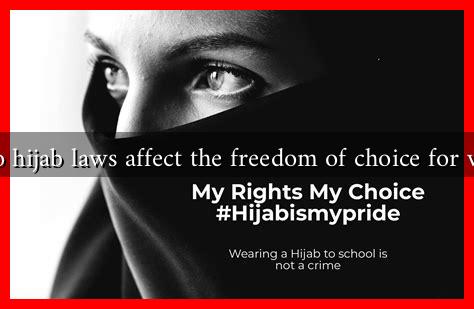-
Table of Contents
How Do Hijab Laws Affect the Freedom of Choice for Women?
The hijab, a traditional headscarf worn by many Muslim women, has become a focal point of debate regarding women’s rights and freedom of choice. In various countries, laws and regulations surrounding the hijab can significantly impact women’s autonomy, personal expression, and societal roles. This article explores how hijab laws affect women’s freedom of choice, examining the implications of both mandatory and prohibitive regulations.
The Context of Hijab Laws
Hijab laws vary widely across the globe, influenced by cultural, religious, and political factors. In some countries, wearing the hijab is mandated by law, while in others, it is banned. These contrasting approaches raise critical questions about women’s rights and their ability to make personal choices.
- Mandatory Hijab Laws: Countries like Iran and Saudi Arabia enforce laws requiring women to wear the hijab in public. These laws are often justified by religious interpretations and cultural norms.
- Prohibitive Hijab Laws: In contrast, countries like France and Turkey have implemented bans on wearing the hijab in public institutions, citing secularism and the separation of religion from state affairs.
The Impact of Mandatory Hijab Laws
In countries where hijab laws are mandatory, women often face severe consequences for non-compliance. These laws can restrict women’s freedom of choice in several ways:
- Loss of Autonomy: Women may feel compelled to wear the hijab against their will, undermining their personal agency and freedom of expression.
- Social Pressure: The societal expectation to conform can lead to ostracism or punishment for those who choose not to wear the hijab.
- Legal Repercussions: In some cases, women can face legal penalties, including fines or imprisonment, for failing to adhere to hijab laws.
For instance, in Iran, women have been arrested for not wearing the hijab properly, leading to widespread protests and calls for reform. The 2022 death of Mahsa Amini, a young woman detained for allegedly violating hijab laws, sparked international outrage and highlighted the extreme measures taken to enforce these regulations.
The Consequences of Prohibitive Hijab Laws
On the other hand, prohibitive hijab laws can also infringe upon women’s freedom of choice. While these laws are often framed as promoting gender equality and secularism, they can have unintended consequences:
- Marginalization: Women who choose to wear the hijab may feel marginalized or discriminated against in public spaces, leading to a sense of alienation.
- Identity Suppression: Bans on the hijab can suppress cultural and religious identities, forcing women to conform to a dominant societal norm.
- Resistance and Backlash: Such laws can provoke resistance among women, leading to protests and movements advocating for their right to choose.
In France, the 2004 law banning religious symbols in public schools has been met with significant backlash from Muslim communities, who argue that it infringes on their freedom of expression and religious practice. This has led to ongoing debates about secularism and the rights of religious minorities.
Case Studies and Statistics
Research indicates that hijab laws can have profound effects on women’s lives. A study by the Pew Research Center found that:
- In countries with mandatory hijab laws, over 60% of women reported feeling pressured to conform.
- In France, approximately 70% of Muslim women surveyed felt that the hijab ban negatively impacted their sense of belonging in society.
These statistics underscore the complex relationship between hijab laws and women’s freedom of choice, revealing that both mandatory and prohibitive regulations can lead to feelings of oppression and exclusion.
Conclusion
Hijab laws, whether mandatory or prohibitive, significantly affect women’s freedom of choice. While some women may choose to wear the hijab as an expression of their faith, others may feel coerced into compliance or face discrimination for their choices. The ongoing debates surrounding these laws highlight the need for a nuanced understanding of women’s rights and personal autonomy. Ultimately, the freedom to choose—whether to wear the hijab or not—should be respected as a fundamental human right.
For further reading on women’s rights and religious freedoms, you can explore resources from organizations like Human Rights Watch and Amnesty International.

